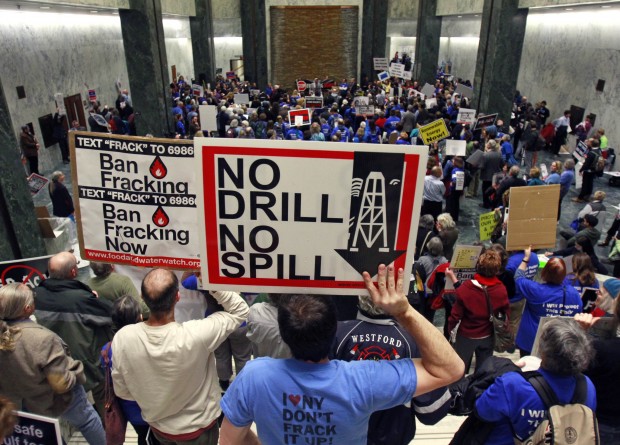5 takeaways for PA following New York's fracking ban
After more than six years of studying the issue, New York decided to ban fracking this week.
Officials there cited environmental and health risks. The state’s acting health commissioner, Howard Zucker, said there wasn’t enough research to know for sure if fracking poses a health threat, but he wasn’t comfortable recommending it.
“There are many red flags because scientific issues have not yet been comprehensively studied through rigorous scientific research at this time,” Zucker said.
What does this news mean for Pennsylvania?
Here are five takeaways:
1. Both sides of the drilling debate feel like it could be good for Pennsylvania
Industry representatives say New York’s loss is Pennsylvania’s gain. Drillers and support service companies no longer have to worry about the Empire State poaching business.
“I would say to New Yorkers, ‘Come to Pennsylvania and take advantage of these jobs that are available with this well-paying industry,'” says Stephanie Catarino Wissman, head of Pennsylvania’s division of the American Petroleum Institute.
Environmental groups and fracking opponents are happy because they feel like New York’s decision validates what they’ve been saying all along: gas development poses risks.
“This is a great day for the environmental community,” says Joanne Kilgour of the Pennsylvania Sierra Club. “And it’s a great day for the people in the shale fields whose experience has been repeatedly denied by the industry.”
2. Governor-elect Wolf plans to create a registry of public health complaints
In the wake of New York’s decision, newly-elected governor Tom Wolf says he plans to make the state Department of Health more transparent in how it handles drilling-related complaints. He also plans to follow Colorado’s example and create a public health registry.
Pennsylvania’s health department was accused earlier this year of ignoring drilling-related health complaints. The agency later updated its policies.
3. The Delaware River Basin’s fracking moratorium will likely continue
The Delaware River Basin Commission (DRBC) is a compact between the federal government and four states: Pennsylvania, Delaware, New York, and New Jersey. The commission oversees the river’s watershed, which covers the eastern part of Pennsylvania. It has had a de facto moratorium on fracking since the drilling boom began.
Governor Tom Corbett opposed the moratorium. But for a long time, his political counterparts seemed unwilling to resolve the stalemate. Delaware supported the ban on drilling. New York was on the fence about fracking for years, and it isn’t anymore. New Jersey and the Obama administration have been silent on the matter. When Wolf takes over next month, Pennsylvania’s position will change. So now a majority of states (Pennsylvania, New York, and Delaware) support continuing the moratorium.
4. This probably won’t change how Pennsylvanians feel about the industry
Terry Madonna, director of the Franklin & Marshall College’s Center for Politics and Public Affairs, has done extensive polling on how Pennsylvanians view drilling.
He says the average voter doesn’t pay much attention to the gas industry to begin with.
“Unless they’re reading about the fracking tax or some spill, it’s just not something they’re aware of on a daily basis,” says Madonna. “New York does not do fracking now, so the fact they won’t do it in the future, how will that change the attitudes of Pennsylvanians? I don’t think it plays a big role.”
5. The gas industry is here to stay
Drillers have spent years investing billions of dollars in Pennsylvania. Production figures continue to break records, there’s a major shift toward using gas in electric power generation, and companies are rapidly building new infrastructure like pipelines to reach new markets.
Wolf says he wants tougher regulations but opposes a ban and believes fracking can be done safely.
“I want to have my cake and eat it too,” he says of balancing the economic benefits and potential risks of gas development. “I don’t want to do what New York did.”

















